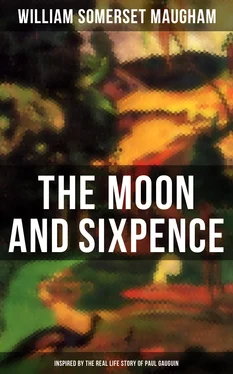I do not know why I made my enquiry as casual as possible.
"Does Mr. Strickland live here by any chance?" I asked.
"Number thirty-two. On the sixth floor."
I was so surprised that for a moment I did not answer.
"Is he in?"
The waiter looked at a board in the bureau.
"He hasn't left his key. Go up and you'll see."
I thought it as well to put one more question.
"Madame est la?"
"Monsieur est seul."
The waiter looked at me suspiciously as I made my way upstairs. They were dark and airless. There was a foul and musty smell. Three flights up a Woman in a dressing-gown, with touzled hair, opened a door and looked at me silently as I passed. At length I reached the sixth floor, and knocked at the door numbered thirty-two. There was a sound within, and the door was partly opened. Charles Strickland stood before me. He uttered not a word. He evidently did not know me.
I told him my name. I tried my best to assume an airy manner.
"You don't remember me. I had the pleasure of dining with you last July."
"Come in," he said cheerily. "I'm delighted to see you. Take a pew."
I entered. It was a very small room, overcrowded with furniture of the style which the French know as Louis Philippe. There was a large wooden bedstead on which was a billowing red eiderdown, and there was a large wardrobe, a round table, a very small washstand, and two stuffed chairs covered with red rep. Everything was dirty and shabby. There was no sign of the abandoned luxury that Colonel MacAndrew had so confidently described. Strickland threw on the floor the clothes that burdened one of the chairs, and I sat down on it.
"What can I do for you?" he asked.
In that small room he seemed even bigger than I remembered him. He wore an old Norfolk jacket, and he had not shaved for several days. When last I saw him he was spruce enough, but he looked ill at ease: now, untidy and ill-kempt, he looked perfectly at home. I did not know how he would take the remark I had prepared.
"I've come to see you on behalf of your wife."
"I was just going out to have a drink before dinner. You'd better come too. Do you like absinthe?"
"I can drink it."
"Come on, then."
He put on a bowler hat much in need of brushing.
"We might dine together. You owe me a dinner, you know."
"Certainly. Are you alone?"
I flattered myself that I had got in that important question very naturally.
"Oh yes. In point of fact I've not spoken to a soul for three days. My French isn't exactly brilliant."
I wondered as I preceded him downstairs what had happened to the little lady in the tea-shop. Had they quarrelled already, or was his infatuation passed? It seemed hardly likely if, as appeared, he had been taking steps for a year to make his desperate plunge. We walked to the Avenue de Clichy, and sat down at one of the tables on the pavement of a large cafe.
Table of Contents
The Avenue de Clichy was crowded at that hour, and a lively fancy might see in the passers-by the personages of many a sordid romance. There were clerks and shopgirls; old fellows who might have stepped out of the pages of Honore de Balzac; members, male and female, of the professions which make their profit of the frailties of mankind. There is in the streets of the poorer quarters of Paris a thronging vitality which excites the blood and prepares the soul for the unexpected.
"Do you know Paris well?" I asked.
"No. We came on our honeymoon. I haven't been since."
"How on earth did you find out your hotel?"
"It was recommended to me. I wanted something cheap."
The absinthe came, and with due solemnity we dropped water over the melting sugar.
"I thought I'd better tell you at once why I had come to see you," I said, not without embarrassment.
His eyes twinkled. "I thought somebody would come along sooner or later. I've had a lot of letters from Amy."
"Then you know pretty well what I've got to say."
"I've not read them."
I lit a cigarette to give myself a moment's time. I did not quite know now how to set about my mission. The eloquent phrases I had arranged, pathetic or indignant, seemed out of place on the Avenue de Clichy. Suddenly he gave a chuckle.
"Beastly job for you this, isn't it?"
"Oh, I don't know," I answered.
"Well, look here, you get it over, and then we'll have a jolly evening."
I hesitated.
"Has it occurred to you that your wife is frightfully unhappy?"
"She'll get over it."
I cannot describe the extraordinary callousness with which he made this reply. It disconcerted me, but I did my best not to show it. I adopted the tone used by my Uncle Henry, a clergyman, when he was asking one of his relatives for a subscription to the Additional Curates Society.
"You don't mind my talking to you frankly?"
He shook his head, smiling.
"Has she deserved that you should treat her like this?"
"No."
"Have you any complaint to make against her?"
"None."
"Then, isn't it monstrous to leave her in this fashion, after seventeen years of married life, without a fault to find with her?"
"Monstrous."
I glanced at him with surprise. His cordial agreement with all I said cut the ground from under my feet. It made my position complicated, not to say ludicrous. I was prepared to be persuasive, touching, and hortatory, admonitory and expostulating, if need be vituperative even, indignant and sarcastic; but what the devil does a mentor do when the sinner makes no bones about confessing his sin? I had no experience, since my own practice has always been to deny everything.
"What, then?" asked Strickland.
I tried to curl my lip.
"Well, if you acknowledge that, there doesn't seem much more to be said."
"I don't think there is."
I felt that I was not carrying out my embassy with any great skill. I was distinctly nettled.
"Hang it all, one can't leave a woman without a bob."
"Why not?"
"How is she going to live?"
"I've supported her for seventeen years. Why shouldn't she support herself for a change?"
"She can't."
"Let her try."
Of course there were many things I might have answered to this. I might have spoken of the economic position of woman, of the contract, tacit and overt, which a man accepts by his marriage, and of much else; but I felt that there was only one point which really signified.
"Don't you care for her any more?"
"Not a bit," he replied.
The matter was immensely serious for all the parties concerned, but there was in the manner of his answer such a cheerful effrontery that I had to bite my lips in order not to laugh. I reminded myself that his behaviour was abominable. I worked myself up into a state of moral indignation.
"Damn it all, there are your children to think of. They've never done you any harm. They didn't ask to be brought into the world. If you chuck everything like this, they'll be thrown on the streets.
"They've had a good many years of comfort. It's much more than the majority of children have. Besides, somebody will look after them. When it comes to the point, the MacAndrews will pay for their schooling."
"But aren't you fond of them? They're such awfully nice kids. Do you mean to say you don't want to have anything more to do with them?"
"I liked them all right when they were kids, but now they're growing up I haven't got any particular feeling for them."
"It's just inhuman."
"I dare say."
"You don't seem in the least ashamed."
"I'm not."
I tried another tack.
"Everyone will think you a perfect swine."
"Let them."
"Won't it mean anything to you to know that people loathe and despise you?"
"No."
His brief answer was so scornful that it made my question, natural though it was, seem absurd. I reflected for a minute or two.
Читать дальше









![John Bruce - The Lettsomian Lectures on Diseases and Disorders of the Heart and Arteries in Middle and Advanced Life [1900-1901]](/books/749387/john-bruce-the-lettsomian-lectures-on-diseases-and-disorders-of-the-heart-and-arteries-in-middle-and-advanced-life-1900-1901-thumb.webp)

